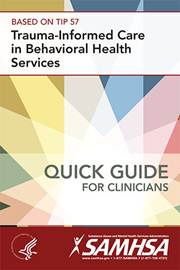
"In a trauma informed system, trauma is viewed not as a single discrete event, but rather as a defining and organizing experience that forms the core of an individual's identity. The far reaching impact and the attempts to cope with the aftermath of the traumatic experience come to define who the trauma survivor is." (Harris and Fallot, 2001)
| The New Jersey Division of Mental Health and Addiction Services (DMHAS) maintains that recovery from trauma is possible, therefore trauma sensitivity shall be a governing principle of DMHAS as we address policy making, service system design and implementation, workforce development, and professional practice. |

Quick Guide for Clinicians Based on TIP 57: Trauma-Informed Care in Behavioral Health Services
Click here or on the image to download the brochure.

SAMHSA Guidelines on "How We Talk About it Matters" and the Carter Center's Journalism Resource Guide on Behavioral Health
How does DMHAS define trauma?
Trauma refers to extreme stress that overwhelms an individual’s ability to cope. Individual trauma can result from an event, a series of events, or circumstances that an individual experiences as physically or emotionally harmful or threatening. It is not the objective facts of an event that determines whether that event is traumatic; it is the way in which each individual internalizes the emotional experience of the event. Traumatic events or circumstances often have lasting adverse effects on an individual’s basic sense of self, trust in others, physical, social, emotional, or spiritual well-being.
DMHAS recognizes that staff throughout the system of care is at risk for vicarious traumatization. A culture shift toward a trauma-informed system of care also rests on staff members’ experiences of safety, trustworthiness, choice, collaboration, and empowerment. Staff shall be provided with support, protocols, education and opportunities for training and supervision to maintain wellness and resiliency. (SAMHSA, 2012)
What is a Trauma Informed System of Care?
In a Trauma-informed system, and in recognition that the majority of individuals who seek mental health and substance abuse services have experienced trauma, screening, assessment and trauma sensitive services must be applied universally to every individual. In a trauma-informed system, services are designed to address the needs of trauma survivors. Services must:
Include the impact of all types of trauma: disaster, vicarious traumatization, acute, continuous, etc.
DMHAS is committed to the development of a trauma informed system of care within our existing wellness and recovery oriented framework for both the state psychiatric hospitals and the community based system. Supervision and training must be implemented to prevent employees from experiencing compassion fatigue and/or vicarious traumatization.
Trauma-Informed services must be based on principles, policies, and procedures that provide safety, voice and choice, and carried out within every part of a system and/or agency, including administration, and management. The current service delivery system needs to be assessed and modified to incorporate Trauma-Informed principles into practice. (SAMHSA, 2012)
When an organization can say that its culture reflects all of the values above in each contact, physical setting, relationship, and activity; in both the experiences of staff as well as consumers, then the culture is trauma-informed. (Roger D. Fallot, Ph.D. and Maxine Harris, Ph.D.; July, 2009)
Values and Guiding Principles for a Trauma Informed System of Care - this document outlines the basic principles that DMHAS has put forth for agencies to use as they create a new, or continue to grow an existing trauma informed and trauma sensitive culture of trauma informed care.
Values and Guiding Principles Slide Show - this PowerPoint show can be used within any agency to assist you in the introduction of cultural changes to staff and service recipients.
Trauma Assessment ToolsFor people with histories of traumatic life events, thorough assessment gathers the information necessary to understand the role and effect of the trauma in their lives; appropriate treatment objectives, goals, planning, and placement; and any ongoing diagnostic and treatment considerations, including reevaluation or follow-up. These measures are identified as evidence based through SAMHSA and in the Center for Substance Abuse Treatment's: TREATMENT IMPROVEMENT PROTOCOL 57: Trauma-Informed Care in Behavioral Health Services.
DMHAS position and directions for agencies: Trauma Assessment
Trauma champions are the individuals who mentor and coach us through change, mitigate the impact of new direction, and keep us on task and help with problem solving along the way:
| "A champion understands the impact of violence and victimization on the lives of people seeking mental health or addiction services and is a front-line worker who thinks ‘trauma first.' When trying to understand a person's behavior, the champion will ask, ‘is this related to abuse and violence?' A champion will also think about whether his or her own behavior is hurtful or insensitive to the needs of a trauma survivor. The champion is there to do an identified job-he is a case manager or a counselor or a residential specialist-but in addition to his or her job, a champion is there to shine the spotlight on trauma issues." -Harris & Fallot, 2001. |
The New Jersey Department of Human Services, Division of Mental Health & Addiction Services recognizes the national statistics that indicate that Universal Precautions are necessary in all agencies throughout our system (43%-81% of adults in psychiatric hospitals and up to 2/3 of individuals in substance abuse treatment have experienced trauma.) Staff who work with individuals who have trauma have special responsibilities because of the nature of this work whether they are administrative, clinical, supervisory or non-clinical. Assigning a trauma-aware staff member who is committed to trauma informed services, will help agency efforts stay focused and on track.
Guidelines for Conducting an Organization of Self-Assessment of Staff Competencies to provide Trauma-Informed Services - these guidelines will help agencies to conduct a self-assessment of staff competencies to provide trauma-informed services. DMHAS wants you to perform this assessment and keep your results on file as you begin to assign your trauma champions and teams. As you move through each layer of staffing, keep in mind those who you may want to choose as champions for trauma.
Comfort RoomsA trauma-informed approach can be implemented in any type of service setting or organization to address the consequences of trauma and to facilitate healing. One tool that SAMHSA recommends for all levels of care is Comfort Rooms: a preventive tool recommended by SAMHSA as an alternative to seclusion and restraint. The Comfort Room is a participatory project between agencies and the people they serve, and includes comfort strategies and environmental changes throughout the entire culture of each agency, which ultimately produce culture change and impact throughout our system.
Information from Assistant Commissioner Lynn Kovich - October, 2014
Guidelines for Development of Comfort Rooms - we believe that Comfort Rooms can play a vital role in recovery, and are an integral part of systems that are Trauma Informed. The DMHAS Trauma Informed Care Work Group, along with staff from Essex County Hospital Center have developed guidelines for agencies throughout the system who may want to begin working toward implementing a Comfort Room in their agency.
Comfort Rooms Slide Show - This PowerPoint can be used by agencies to introduce the Comfort Rooms to your staff and service recipients as you look toward creating a more trauma sensitive culture.
Trauma ScreeningBecause universal trauma informed screening can prevent misdiagnosis and inappropriate treatment planning, SAMHSA has put forth, and NJ DMHAS has adopted, the following recommendation:
| "All adults and children who enter the system of care, regardless of which "door" they enter, should be screened for abuse and trauma at or close to admission. " |
Two evidence based screening tools are recommended for use within all DMHAS agencies throughout the system of care. These measures are identified as evidence based through SAMHSA and in the Center for Substance Abuse Treatment's: TREATMENT IMPROVEMENT PROTOCOL 57: Trauma-Informed Care in Behavioral Health Services.
Division of Mental Health and Addiction Services Trauma Informed Care Universal Screening - Trauma-informed screening is an essential part of the intake evaluation and the treatment planning process. If someone acknowledges a trauma history, further assessment is necessary to determine the extent of trauma-related symptoms. If you are already screening for trauma, using a different evidenced based tool, please continue to use what has been proven as successful for you. If you do not have policy for a formal screening process or tool, please use this documentation to move with us toward being more trauma informed.
DMHAS Blueprint for ActionThe DMHAS blueprint for action has been adapted from the SAMHSA toolkit: Building Trauma-Informed Mental Health Service Systems: Blueprint for Action, which describes a current state behavioral health system and organizational activities that are needed to make the transition to a trauma-informed system with emerging best practices, and trauma-specific services (2004; Ann Jennings, Ph.D.; for NASMHPD, SAMSHA) In a trauma-informed system, services are designed to address the needs of trauma survivors. The New Jersey Department of Human Services/Division of Mental Health and Addiction Services (DHS/DMHAS) agrees with national experts: trauma sensitivity shall be a governing principle in policy making, service system design and implementation, workforce development, and professional practice.
DMHAS Blueprint for Action: Building a Trauma-Informed Behavioral Health Service System for New Jersey - this blueprint describes steps to infuse trauma-informed practices into the New Jersey Mental Health and Addictions system of care and provides specific practices to meet the needs of trauma survivors.